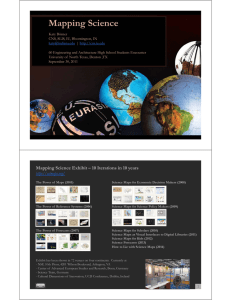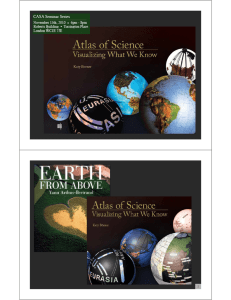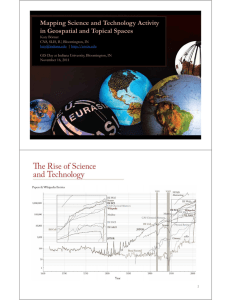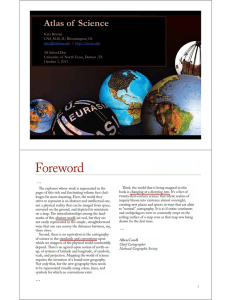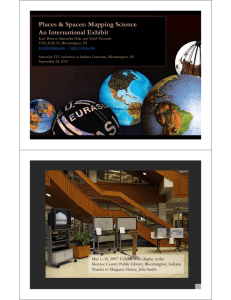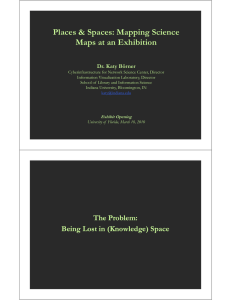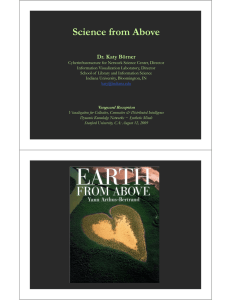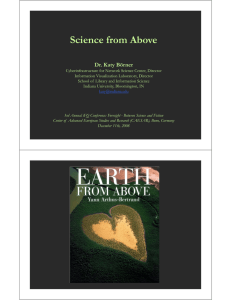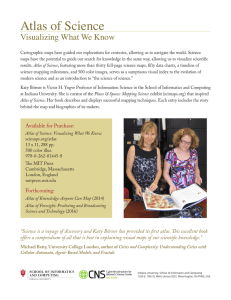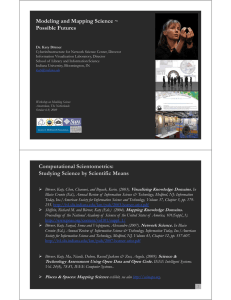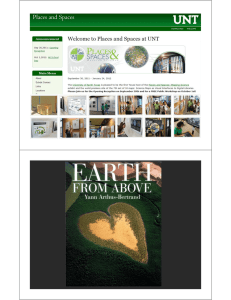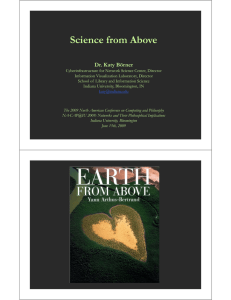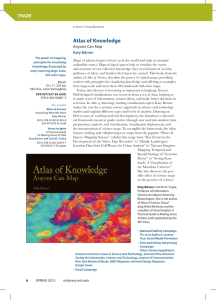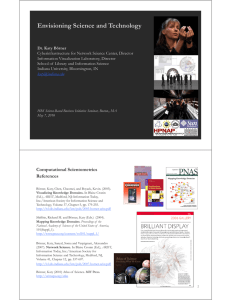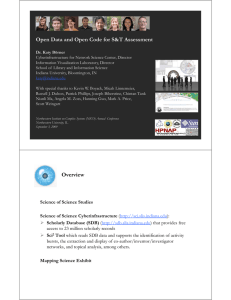Places & Spaces: Mapping Science
advertisement
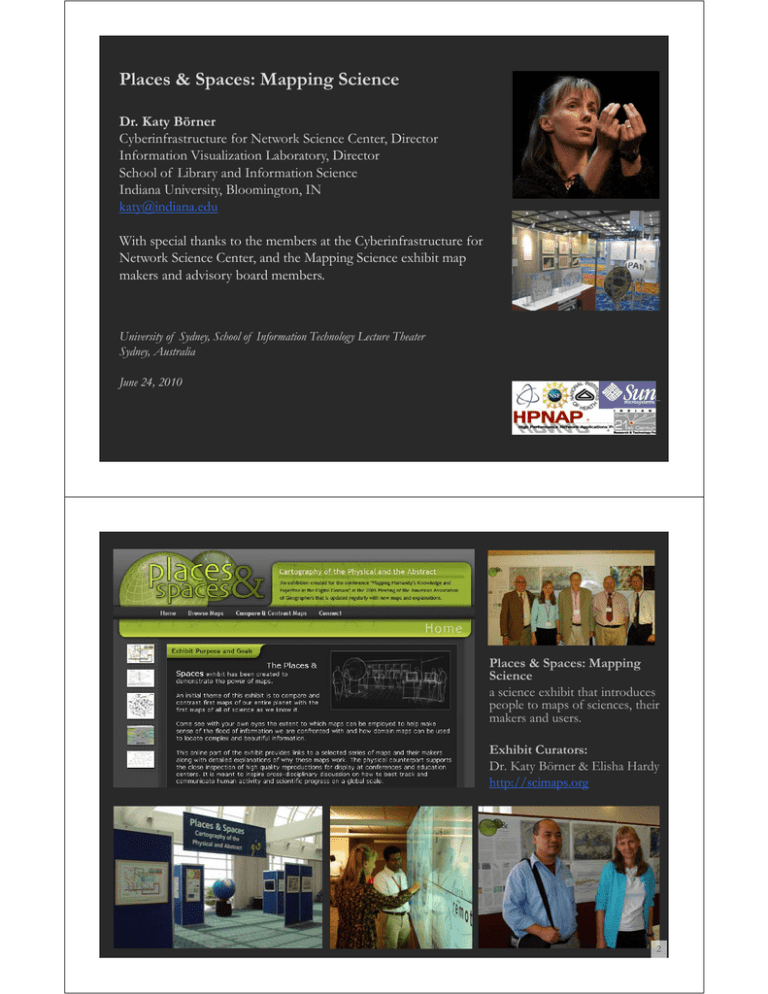
Places & Spaces: Mapping Science Dr. Katy Börner Cyberinfrastructure for Network Science Center, Director Information Visualization Laboratory Laboratory, Director School of Library and Information Science Indiana University, Bloomington, IN katy@indiana.edu With special thanks to the members at the Cyberinfrastructure for Network Science Center, and the Mapping Science exhibit map makers and advisory board members. University of Sydney, School of Information Technology Lecture Theater Sydney, Australia June 24, 2010 Places & Spaces: Mapping Science a science exhibit that introduces people to maps of sciences, their makers k andd users. Exhibit Curators: Dr. Katy Börner & Elisha Hardy http://scimaps.org 2 Mapping Science Exhibit – 10 Iterations in 10 years http://scimaps.org/ The Power of Maps (2005) Science Maps for Economic Decision Makers (2008) The Power of Reference Systems (2006) Science Maps for Science Policy Makers (2009) The Power of Forecasts (2007) Science Maps for Scholars (2010) Science S i M Maps as Vi Visuall IInterfaces t f to t Digital Di it l Libraries Lib i (2011) Science Maps for Kids (2012) Science Forecasts (2013) How to Lie with Science Maps (2014) Exhibit has been shown in 72 venues on four continents. Currently at - NSF, 10th Floor, 4201 Wilson Boulevard, Arlington, VA - Marston Science Library, University of Florida, Gainesville, FL - Center of Advanced European Studies and Research, Bonn, Germany - Science Train, Germany. 3 Debut D b off 5th Iteration I i off Mapping M i SScience i E Exhibit hibi at MEDIA X was on M May 18 18, 2009 at W Wallenberg ll b H Hall, ll Stanford University, http://mediax.stanford.edu, http://scaleindependentthought.typepad.com/photos/scimaps 4 Science Maps in “Expedition Zukunft” science train visiting 62 cities in 7 months, 12 coaches, 300 m long. Opening was on April 23rd, 2009 by German Chancellor Merkel, http://www.expedition-zukunft.de 5 Börner, Katy (2010) Atlas of Science. MIT Press. http://scimaps.org/atlas 6 Börner, Katy (2010) Atlas of Science. MIT Press. http://scimaps.org/atlas 7 Börner, Katy (2010) Atlas of Science. MIT Press. http://scimaps.org/atlas 8 Börner, Katy (2010) Atlas of Science. MIT Press. http://scimaps.org/atlas 9 S&T Navigation, Management Tools that Different Stakeholders Want Funding Agencies Need to monitor (long-term) money flow and research developments, identify areas for future development, p , stimulate new research areas,, evaluate fundingg strategies for different programs, decide on project durations, funding patterns. Scholars Want easy access to research results, relevant funding programs and their success rates, potential collaborators, competitors, related projects/publications (research push). I d t Industry Is interested in fast and easy access to major results, experts, etc. Influences the direction of research by entering information on needed technologies (industry pull). (industry-pull). Advantages for Publishers Need easy to use interfaces to massive amounts of interlinked data. Need to communicate data p provenance,, qquality, y, and context. Society Needs easy access to scientific knowledge and expertise. Th Power The P r off Maps M p Four Early Maps of Our World VERSUS Si E Six Early l M Maps off S Science i (1st Iteration of Places & Spaces Exhibit - 2005) How would a map of science look? What metaphors p would work best? Th Power The P r off Reference R f r n Systems S t m Four Existing Reference Systems VERSUS Si P Six Potential i lR Reference f S Systems off S Science i (2nd Iteration of Places & Spaces Exhibit - 2006) How would a reference system for all of s i n look? science l k? What dimensions would it have? The Power of Forecasts F Four Existing E i ti F Forecasts t VERSUS Six Potential Science ‘Weather’ Weather Forecasts (3rd Iteration of Places & Spaces Exhibit - 2007) Named Storms, available online at http://svs.gsfc.nasa.gov/vis/a000000/a003200/a003279 Can one forecast science? What ‘science forecast language’ g g will work? Science Maps for Economic Decision Making Four Existing Maps VERSUS Six Science Maps (4th Iteration of Places & Spaces Exhibit - 2008) What insight needs to economic decision makers m k rs h have?? What data views are most useful? Science Maps for Science Policy Making Four Existing Maps VERSUS Six Science Maps (5th Iteration of Places & Spaces Exhibit - 2009) Bollen, Johan, Herbert Van de Sompel, Aric Hagberg, Luis M.A. Bettencourt, Ryan Chute, Marko A. Rodriquez, Lyudmila Balakireva. 2008. A Clickstream Map of Science. 43 Council for Chemical Research. 2009. Chemical R&D Powers the U.S. Innovation Engine. Washington, DC. Courtesy of the Council for Chemical Research. 44 Additional Elements of the Exhibit Illuminated Diagram Display Hands--on Science Maps for Kids Hands Worldprocessor Globes Illuminated Diagram Display W. Bradford Paley, Kevin W. Boyack, Richard Kalvans, and Katy Börner (2007) Mapping, Illuminating, and Interacting with Science. SIGGRAPH 2007. Questions: p Who is doingg research on what topic and where? What is the ‘footprint’ of interdisciplinary research fields? p have scientists? What impact Large-scale, high resolution prints illuminated via projector or screen. Interactive touch panel. Contributions: Interactive, high resolution interface to access and make sense of data about scholarly activity. 47 Hands--on Science Maps for Kids Hands All maps of science are on sale via http://scimaps.org/ordermaps/ Science Puzzle Map for Kids by Fileve Palmer, Julie Smith, Elisha Hardy and Katy Börner, Indiana University, 2006. (Base map taken from Illuminated Diagram display by Kevin Boyack, Richard Klavans, and W. Bradford Paley.) Activities: Solve the puzzle. Navigate to ‘Earth Science’. Identify major inventions. Place major inventors. Find your dream job on the map. Why is mathematics important? Winners @ AMSE JoHanna Sanders, age 12, a picture of someone enjoying nature and a theme that science is all around us. Sascha Richey, age 8, drew a picture of her mother and explained why her mother is her favorite scientist. Where to go from here? Contact the map makers via the exhibit curators: K Börner Katy B ((k (katy@indiana.edu k @ d katy@indiana.edu) d ) andd El Elisha h Hardy H d (efhardy@indiana.edu efhardy@indiana.edu)) Computational Scientometrics References Börner, Katy, Chen, Chaomei, and Boyack, Kevin. (2003). Visualizing Knowledge Domains. In Blaise Cronin (Ed ) ARIST, (Ed.), ARIST Medford, Medford NJ: Information Today, Today Inc./American Society for Information Science and Technology, Volume 37, Chapter 5, pp. 179-255. http://ivl.slis.indiana.edu/km/pub/2003-borner-arist.pdf Shiffrin, Richard M. and Börner, Katy (Eds.) (2004). Mapping Knowledge Domains. Proceedings of the National Academy of Sciences of the United States of America, 101(Suppl_1). http://www pnas org/content/vol101/suppl 1/ http://www.pnas.org/content/vol101/suppl_1/ Börner, Katy, Sanyal, Soma and Vespignani, Alessandro (2007). Network Science. In Blaise Cronin (Ed.), ARIST, Information Today, d y, Inc./American / Societyy for Information Science and Technology, Medford, NJ, Volume 41, Chapter 12, pp. 537-607. http://ivl.slis.indiana.edu/km/pub/2007-borner-arist.pdf Börner, Katy (2010) Atlas of Science. MIT Press. http://scimaps.org/atlas 71 http://sci.slis.indiana.edu Computational Scientometrics Cyberinfrastructures Scholarly Database: 23 million scholarly records http://sdb.slis.indiana.edu VIVO Research Networking h // i http://vivoweb.org b Information Visualization Cyberinfrastructure http://iv.slis.indiana.edu p Network Workbench Tool & Community Wiki http://nwb.slis.indiana.edu Science of Science (Sci2) Tool and CI Portal http://sci.slis.indiana.edu Epidemics Cyberinfrastructure http://epic.slis.indiana.edu/ 73 Thi is This i the th only l mockup k in i this thi slide lid show. h E Everything hi else l iis available il bl today. d Katy Borner: Computational Scientometrics That Informs Science Policy 74 http://cns.slis.indiana.edu
